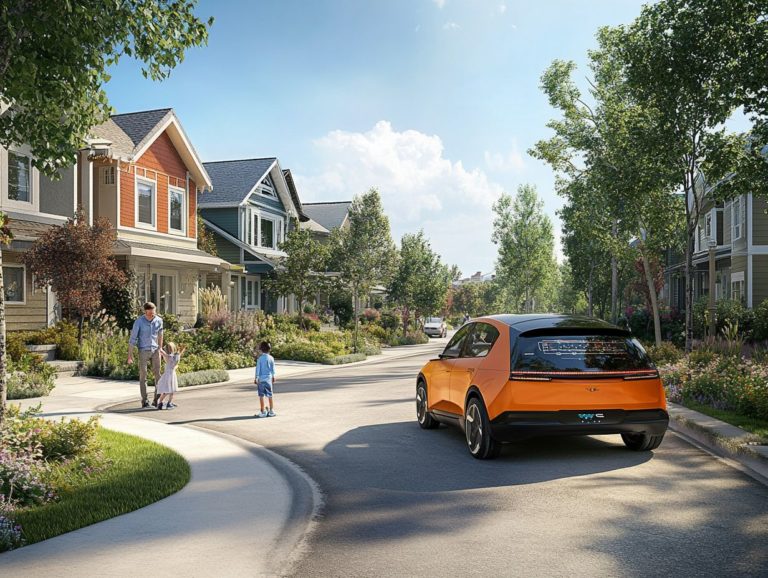Choosing Between Sedans, SUVs, and Trucks
When selecting the perfect vehicle, it s crucial for you to grasp the differences between sedans, SUVs, and trucks. Let s dive in!
Each type presents its own unique features designed to cater to a variety of lifestyles and needs. From budgetary considerations to daily usage, you have several factors to weigh before arriving at a decision.
This article delves into the pros and cons of each vehicle category, illuminating their benefits and limitations to assist you in discovering the ideal match for your driving preferences.
Contents
- Key Takeaways:
- Overview of Sedans, SUVs, and Trucks
- Factors to Consider
- Pros and Cons of Sedans
- Pros and Cons of SUVs
- Pros and Cons of Trucks
- Frequently Asked Questions
- What is the main difference between sedans, SUVs, and trucks?
- Which type of vehicle is best for everyday use?
- What are the fuel efficiency differences between sedans, SUVs, and trucks?
- What factors should I consider when deciding between a sedan, SUV, or truck?
- Are sedans, SUVs, and trucks equally safe?
- How do I decide between a new or used sedan, SUV, or truck?
Key Takeaways:
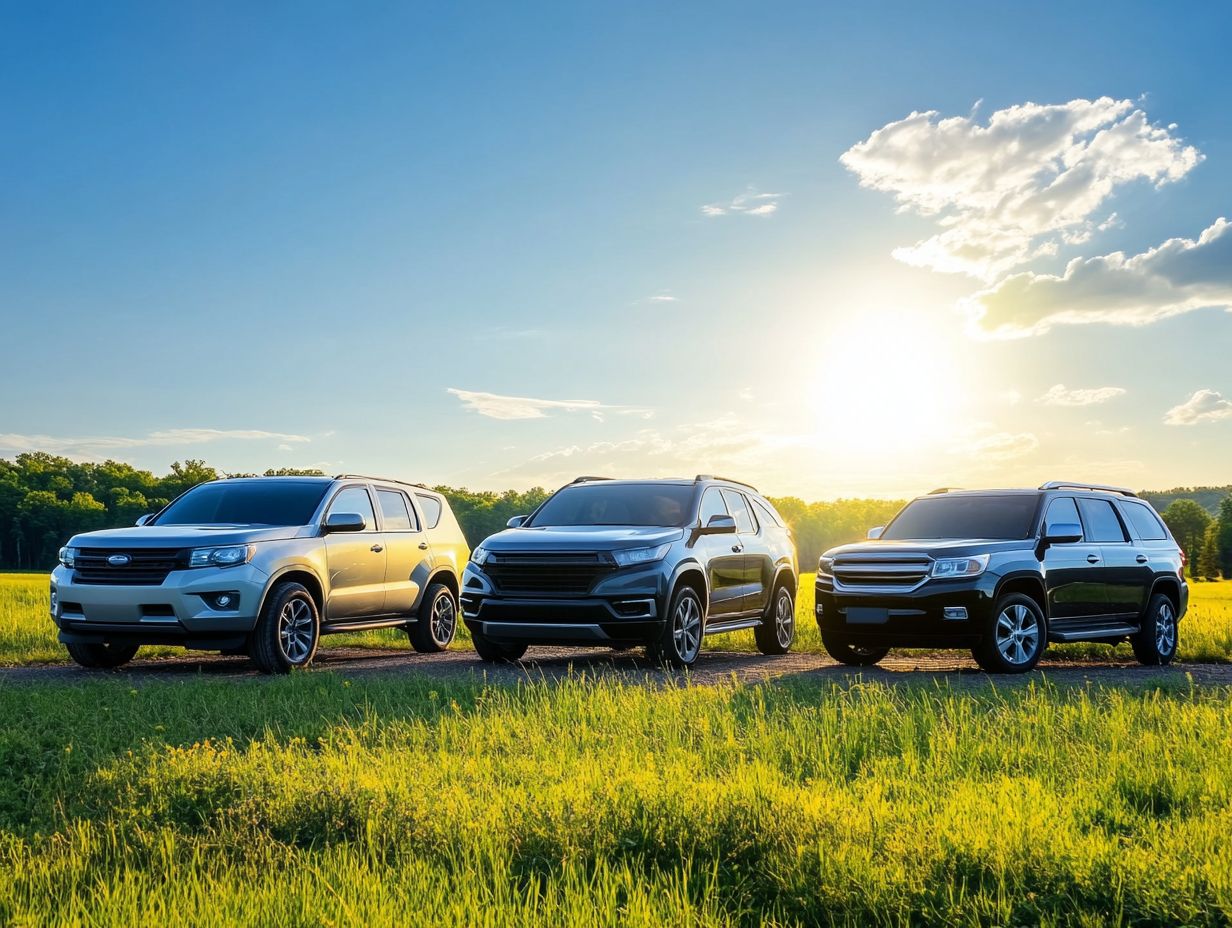
Consider your budget and lifestyle when choosing a vehicle. Sedans are fuel-efficient, SUVs are spacious, and trucks are great for heavy tasks.
Overview of Sedans, SUVs, and Trucks
When selecting the right vehicle for your needs, understanding the different styles available such as sedans, SUVs, and trucks can greatly enhance your car-buying experience.
Each category comes with its unique advantages and drawbacks. It s essential to consider how safe the vehicle is, how much fuel the vehicle uses, and your driving habits.
For example, sedans are renowned for their efficiency, making them ideal for daily commutes.
SUVs offer spacious interiors and versatility, perfect for families or those who love outdoor adventures.
Meanwhile, trucks stand out for their ability to pull heavy loads and ruggedness, appealing to individuals with specific requirements.
Factors to Consider
When you start car shopping, weigh your budget, lifestyle, and needs carefully to ensure you select the ideal vehicle type.
Consider how frequently you ll be driving, the usual terrain you ll encounter, and whether features like safety and fuel efficiency matter more to you than aesthetics.
This careful planning helps you make the best choice that aligns perfectly with your requirements.
Budget and Lifestyle
Determining your budget and lifestyle preferences is essential in the car-buying journey, as it directly influences the types of vehicles you can consider.
If you re working with a tight budget, you might find yourself gravitating toward compact options or sedans that boast excellent fuel economy.
On the other hand, a more flexible budget opens up exciting possibilities, allowing you to explore spacious SUVs or rugged trucks.
Your lifestyle factors like family size, daily commute, and recreational activities play a pivotal role in shaping your choice.
For example, families often prefer larger SUVs for their generous cargo space and seating capacity, while singles might be drawn to the agility and ease of parking that smaller vehicles provide.
If you enjoy outdoor adventures, trucks that can tow trailers become highly appealing, perfectly suited for hauling your gear.
By understanding how your financial constraints and personal circumstances intersect, you can confidently steer yourself toward the vehicle that aligns best with your needs.
Usage and Needs
Understanding your specific usage and needs is essential for making an informed car-buying decision, especially when you consider factors like how safe the vehicle is and your driving habits.
Whether you’re looking for a vehicle for daily commuting, weekend getaways, or hauling cargo, each requirement aligns uniquely with different vehicle styles such as sedans, SUVs, and trucks.
For instance, if you navigate crowded urban areas, you might prioritize compact designs that offer superior maneuverability and parking efficiency.
On the other hand, if you’re a family person, spacious SUVs with advanced safety features and ample room for kids and gear might catch your eye.
Outdoor enthusiasts often seek trucks that emphasize durability and rugged performance.
Meanwhile, eco-conscious drivers might gravitate toward hybrid or electric options that align with their sustainability goals.
Ultimately, evaluating your driving patterns and understanding your requirements will be pivotal in finding the ideal vehicle that expertly balances comfort, convenience, and safety.
Pros and Cons of Sedans
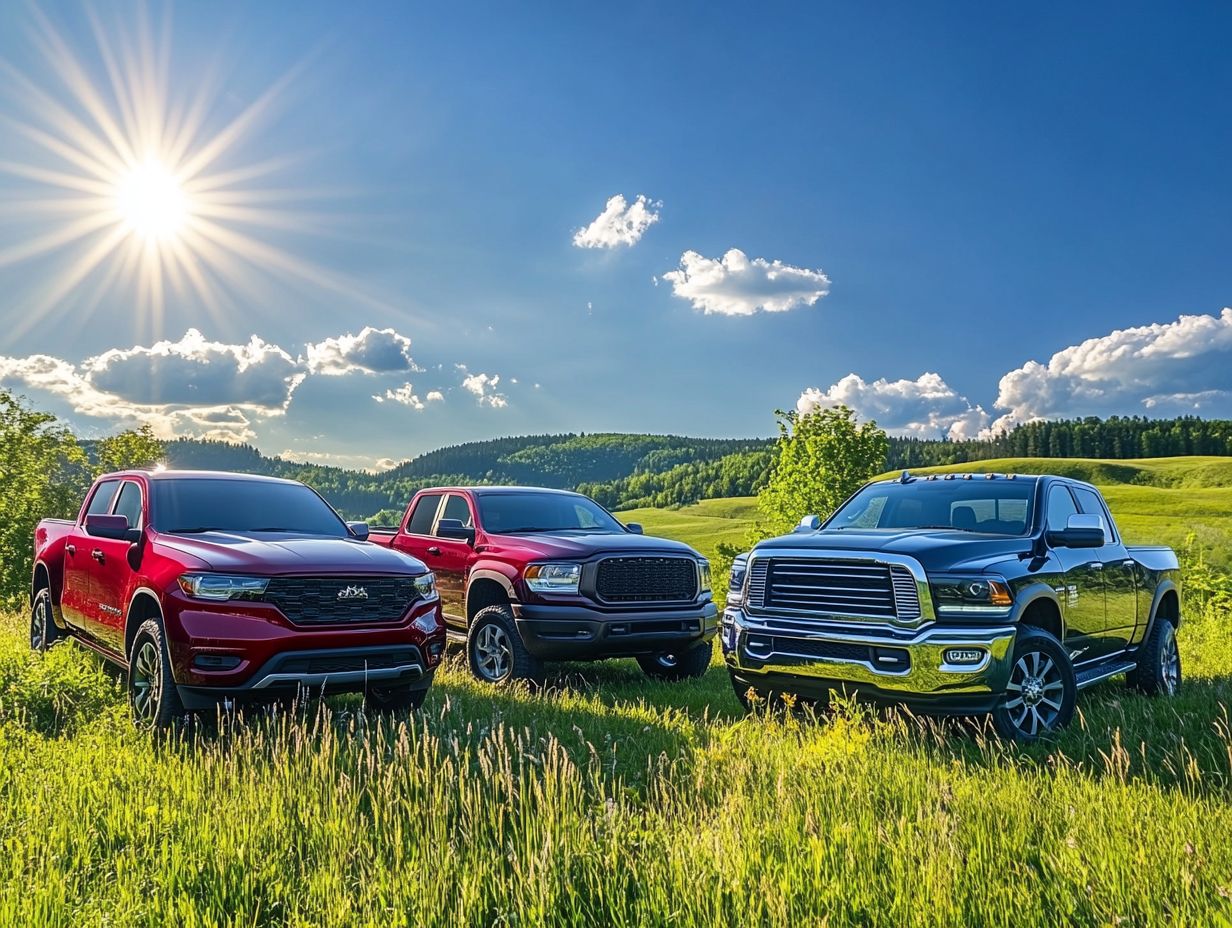
Sedans offer great features that resonate with many drivers, particularly due to their impressive fuel efficiency and practicality.
They are compact in size, delivering a comfortable driving experience ideal for city settings and daily commutes.
However, they may lack spaciousness compared to larger vehicles like SUVs or trucks.
Features and Benefits
One standout quality of sedans is their remarkable fuel economy, which means they can go further on less fuel.
They typically provide a smooth ride and easy handling due to their aerodynamic design. This often results in lower emissions, a significant plus for environmentally conscious consumers.
The spacious interiors and generous trunk space in many models enhance their appeal, allowing for comfortable travel with your belongings.
The security features and advanced technology in today s sedans elevate your driving experience, offering peace of mind and convenience on the road.
With various trim options and customizable features available, these vehicles cater to your unique preferences and lifestyle, making them a versatile choice.
Limits and Drawbacks
While sedans bring many benefits, it s important to know their limitations, especially regarding space and versatility.
If you re a family or need more cargo space, sedans might not be suitable compared to SUVs and trucks.
Although sedans excel in fuel efficiency and handling, their lower ground clearance can pose safety issues, especially in areas prone to flooding or rough terrain.
You may find the confined interiors of many sedans cramped during long trips, which can be a concern for larger families or groups.
When transporting larger items, sedans might require awkward roof racks or extra trips, detracting from convenience.
Weighing the advantages of sedans against these limitations will empower you to make a well-informed decision.
Pros and Cons of SUVs
Sport Utility Vehicles (SUVs) provide a variety of features, making them an exceptional choice for families and adventure enthusiasts.
With spacious interiors and remarkable versatility, these vehicles meet different needs. You can choose a compact SUV for city driving or a more spacious model for memorable road trips.
No matter your choice, you ll find ample cargo space, often accompanied by cutting-edge technology and robust safety features, ensuring every journey is enjoyable and secure.
Features and Benefits
One of the best features of SUVs is their spaciousness, which offers ample room for passengers and cargo, making them ideal for families and outdoor enthusiasts.
Many SUVs come with advanced safety technology that boosts your driving confidence and enhances vehicle safety. This generous interior space allows you to comfortably accommodate children and pets while providing plenty of room for recreational gear or groceries.
Most models prioritize safety with features like adaptive cruise control, lane departure warnings, and automatic emergency braking, ensuring a secure driving experience.
Technological innovations further enhance SUVs, as they often include state-of-the-art infotainment systems. With touchscreen displays, smartphone integration, and advanced navigation tools, every journey becomes enjoyable and seamlessly connected.
Are you ready to find the perfect sedan or SUV that fits your lifestyle? Let’s dive in!
Limits and Drawbacks
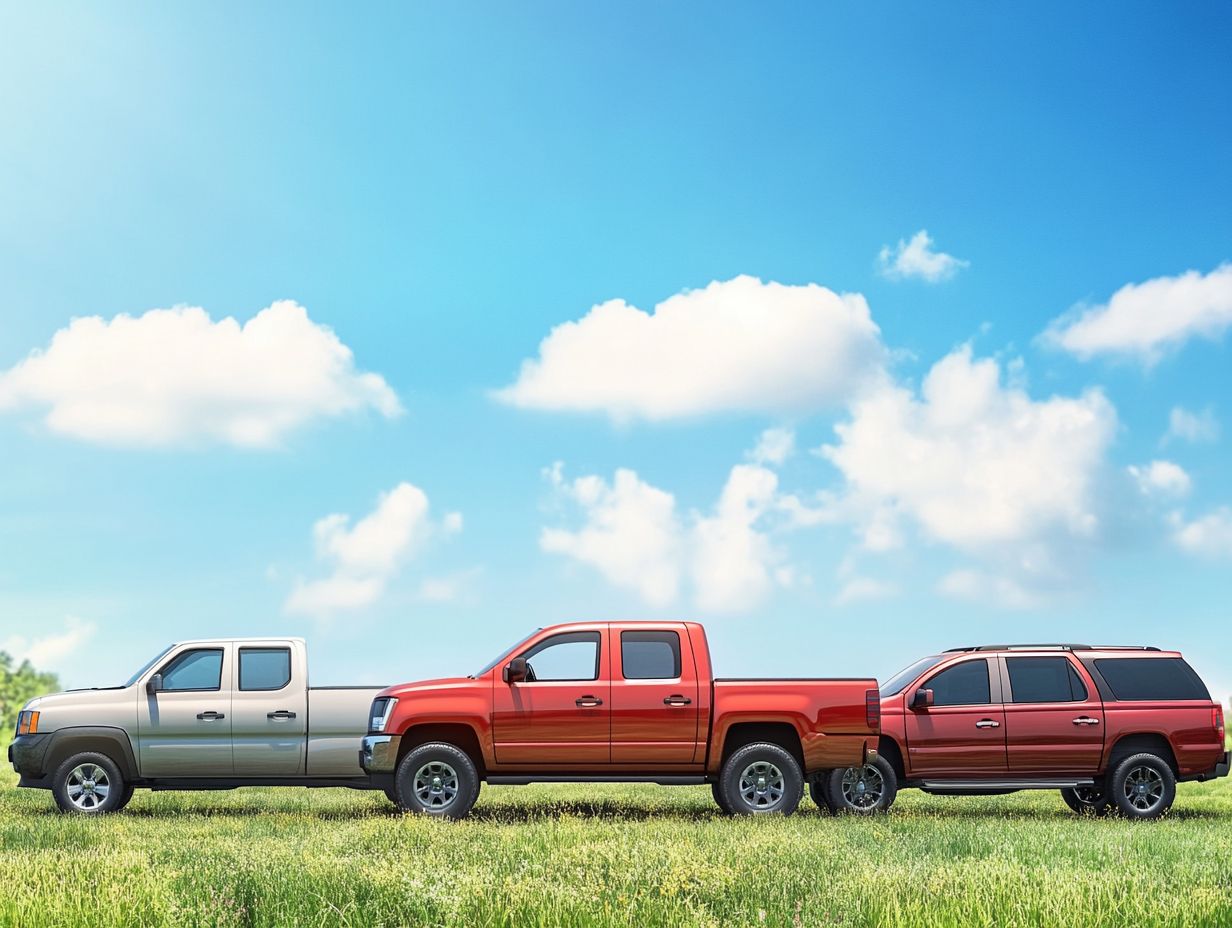
While SUVs certainly offer a range of advantages, it’s essential to recognize their limitations and drawbacks, particularly concerning fuel economy.
Many SUVs tend to consume more fuel compared to sedans, which can make them less economical for your daily commuting and long-distance travel. This increased fuel consumption can quickly add up, resulting in higher expenses at the gas pump something that may not sit well with budget-conscious drivers.
Handling is another critical aspect of your everyday driving experience. Unlike compact cars, which usually provide sharper maneuverability thanks to their lighter weight, many SUVs can feel bulky and cumbersome. This is especially true when driving in the city, where tight parking spaces and winding roads are the norm.
This difference in handling dynamics can detract from your overall driving enjoyment, leading you to question whether an SUV genuinely aligns with your lifestyle and needs.
Pros and Cons of Trucks
Trucks stand as a robust vehicle option, offering a distinctive array of features and benefits, especially for those who demand exceptional towing capabilities and performance on rugged terrain.
Renowned for their powerful engines and superior handling, these vehicles are often the preferred choice for tradespeople and outdoor enthusiasts alike, serving as dependable workhorses that rise to any challenge.
Features and Benefits
One of the standout features of trucks is their exceptional towing capability, allowing you to haul heavy loads that other vehicle types simply can t handle. Designed for rugged performance, trucks are perfect for off-road adventures and tackling challenging terrains.
Imagine hauling your gear effortlessly for weekend adventures! This impressive towing capacity isn t just for weekend getaways; it s also a game-changer for work. You can transport equipment and supplies with ease.
Beyond sheer strength, many trucks come equipped with advanced technologies that enhance performance and fuel efficiency, ensuring a smooth ride whether you’re cruising down the highway or navigating rough paths.
The versatility of trucks shines through in their spacious cargo beds, which enable you to transport everything from construction materials to outdoor gear. This versatility makes trucks a must-have for anyone who loves adventure or needs to get the job done!
Limits and Drawbacks
While trucks offer numerous advantages, it’s essential to acknowledge their limitations, particularly in terms of fuel economy and comfort for daily driving.
You may notice that trucks tend to consume more fuel than sedans or SUVs, and their larger size can make driving in the city a bit tricky.
This increased fuel consumption can put a strain on your budget and raise environmental concerns, prompting many drivers to rethink their choice.
Regarding the driving experience, trucks can feel less comfortable, particularly during lengthy commutes. The stiffer suspension systems, designed to handle heavy loads, often result in a jarring ride.
The elevated seating position might hinder visibility in certain scenarios, making tasks like parking or navigating tight spaces more complicated.
Therefore, for everyday use, these potential drawbacks can easily overshadow the benefits of owning a truck.
Frequently Asked Questions
What is the main difference between sedans, SUVs, and trucks?
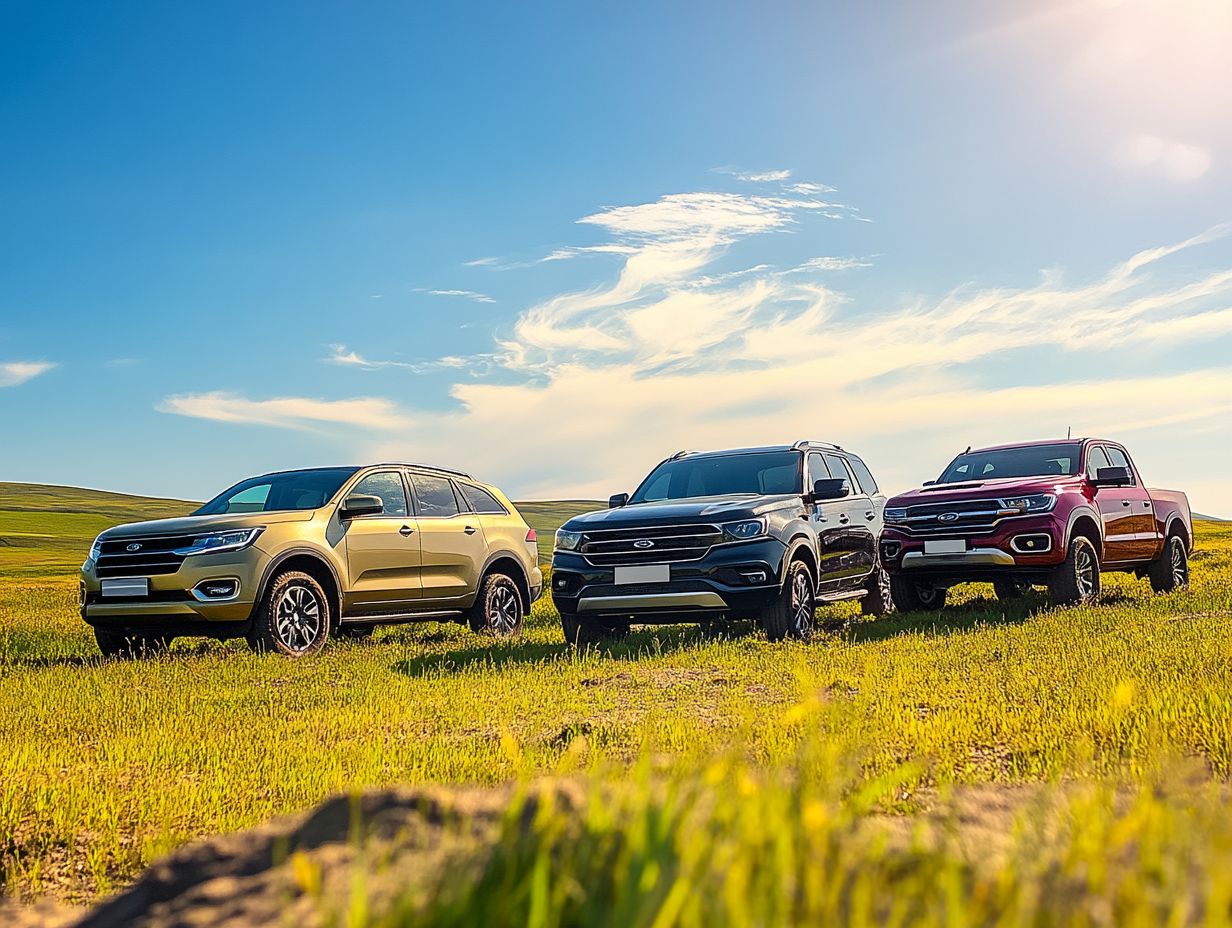
Sedans are typically smaller, more compact vehicles with two rows of seats and a trunk. SUVs are larger and taller than sedans, with more cargo space and the option for four-wheel drive, which helps vehicles drive better on rough or slippery roads. Trucks have a bed for hauling cargo and often have more powerful engines.
Which type of vehicle is best for everyday use?
This depends on personal preference and needs. Sedans are great for commuting and city driving, while SUVs offer more space and power for families and outdoor adventures. Trucks are ideal for those who need to transport large or heavy items regularly.
What are the fuel efficiency differences between sedans, SUVs, and trucks?
Sedans generally have the best fuel efficiency due to their smaller size and lighter weight. SUVs and trucks typically have lower fuel efficiency, but advancements in technology have made them more efficient in recent years.
What factors should I consider when deciding between a sedan, SUV, or truck?
Think about your daily commute. Consider how many passengers you need to carry, your budget, and your lifestyle.
Each vehicle type has its strengths. Choose one that fits your needs!
Are sedans, SUVs, and trucks equally safe?
All three vehicle types are designed with safety in mind. However, SUVs and trucks have a taller design, making them more prone to rollovers.
Sedans are often seen as the safest option due to their lower design.
How do I decide between a new or used sedan, SUV, or truck?
Your choice depends on your budget and what you prefer. New vehicles offer the latest features, but they cost more.
Used vehicles may be cheaper, but they might have higher mileage and need more maintenance. Research and compare your options before deciding!





